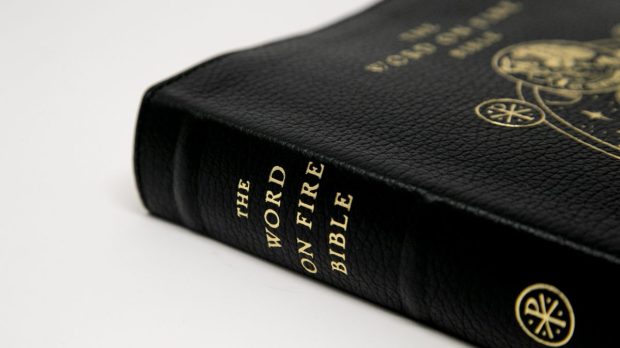In 1913, the innovative Catholic apologist Fr. John Francis Noll wrote, “Any student of reliable history should know that the Catholic Church gave the Bible to the world; that only on her authority the world knows that this book contains inspired writing; that her most learned sons for many centuries spent their lives copying by hand the whole Bible and translating it into different languages.” Today, in 2020, Bishop Robert Barron of Word on Fire offers the Church a Bible that shows this to be the case.
Catholics are oftimes (even if somewhat unfairly) branded notoriously poor readers of Scripture. However, our own Church leaders—including in the United States eloquent teachers and pioneers like John Francis Noll, Fulton Sheen, and now Robert Barron—have encouraged emphatically personal reading and study of the Sacred Page.
In his introduction to the Word on Fire Bible, Bishop Barron remarks, “The Bible is indeed the greatest book ever written…But for so many it is largely opaque, indecipherable—at best a puzzling text from a prescientific age. My fondest hope is that this Word on Fire edition of the Sacred Scriptures can bring God’s Word to life in a fresh way.” This Bible is indeed an evangelical volume. The Word on Fire Bible aims to open up the Scriptures by taking up the tools of the best of Catholic tradition…and it succeeds overwhelmingly.
Why own another Bible?
Due to release Monday, June 15, the multi-volume Word on Fire Bible debuts its first volume: the Gospels. With subsequent releases planned annually for the next few years, this Bible will be a multi-volume collection that truly lives up to the name Biblia Sacra (which means, “the holy books”).
But why purchase another Bible? There’s a real benefit in familiarity with different translations. Sometimes reading a particular verse in a different translation will allow the reader to engage the text with new zeal or uncover previously encountered dimensions of meaning. For this reason alone, Catholic families undoubtedly benefit from owning more than one Bible.
At Mass, American Catholics are used to hearing an English translation called The New American Bible. It’s a translation done for our liturgy and for that reason, namely our acquaintance with the text from hearing it proclaimed, is the translation we most recognize and use.
The Word on Fire Bible makes use of the New Revised Standard Version: Catholic Edition (NRSV-CE), first published in 1989. Word on Fire chose this translation saying, “The NRSV-CE stands out among other translations because of its accuracy and readability.” This translation’s fidelity to the Greek text and facility with English style are a unique combination among modern translations.
Why is the Word on Fire Bible a different kind of study and devotional Bible?
First, for its breadth of tradition. With excerpts from the Church Fathers, selections from Modern saints and Catholic thinkers (including G.K. Chesterton, Flannery O’Connor, and St. John Paul II) and commentary from Bishop Barron, this Bible shows a contiguous and living interpretation of the Biblical text.
Word on Fire has shared that the ratio of commentary to Scripture is 1:1! Do not be dismayed, however. The supplemental text is clearly distinguished from Holy Writ by font and layout. With such careful selection of commentary and navigational ease, it’s no hyperbole to declare the Word on Fire Bible the richest study Bible I’ve ever used.
Second, it’s stunningly beautiful. When I first opened the box, I couldn’t believe how handsome the volume was. Bound in black leather with gold trimmed pages and a gold ribbon bookmark, it’s a magnificent book to hold and page through. The pages themselves are thicker than typical “newsprint” Bibles and the black text is punctuated with lovely golden headings and boxes.
In fact, the layout of each page is truly marvelous. With boxes and graphics denoting the different elements of commentary, the pages themselves are worthy of the Sacred Text. One aspect that particularly suits personal devotion is that this Bible periodically includes verses excerpted in large block letters. The elegant composition, aided by a striking juxtaposition of serif and sans-serif fonts, assists the reader to effortlessly move from study to prayer.
The Via Pulchritudinis
One feature as innovative as it is winsome, is the Word on Fire Bible’s use of art. In addition to the layout and production qualities I’ve mentioned above, this Bible is an evangelization strategy animated by beauty. Bishop Barron has claimed, “The best evangelical strategy is one that moves from the beautiful to the good and finally to the true.” This strategy has been deployed to extraordinary success with the inclusion of many artistic masterpieces interspersed with insightful and enriching commentary.
Over twenty different artistic masters are introduced to the reader through the full-color reproductions and explanatory text included in the volume. This spectacular feature, dubbed by the Word on Fire Bible the Via Pulchritudinis (“the Way of Beauty”), honors Christianity’s incredible artistic patrimony while employing that inheritance in service to the Gospel.
A Worthy Heir
Medieval monasteries spent no small efforts preserving and spreading the Sacred Page. Monks employed their every skill at copying and annotating. Further, marginal notations were scrupulously added to explain and investigate the Biblical text. Verses were also painstakingly illuminated, with monks spending years fabricating marvelous hand-drawn and inked images in their Bibles. Bibles were decorated with precious gems and filled with worthy art and rich teaching alike.
The Word on Fire Bible is a worthy heir to that noble tradition.

